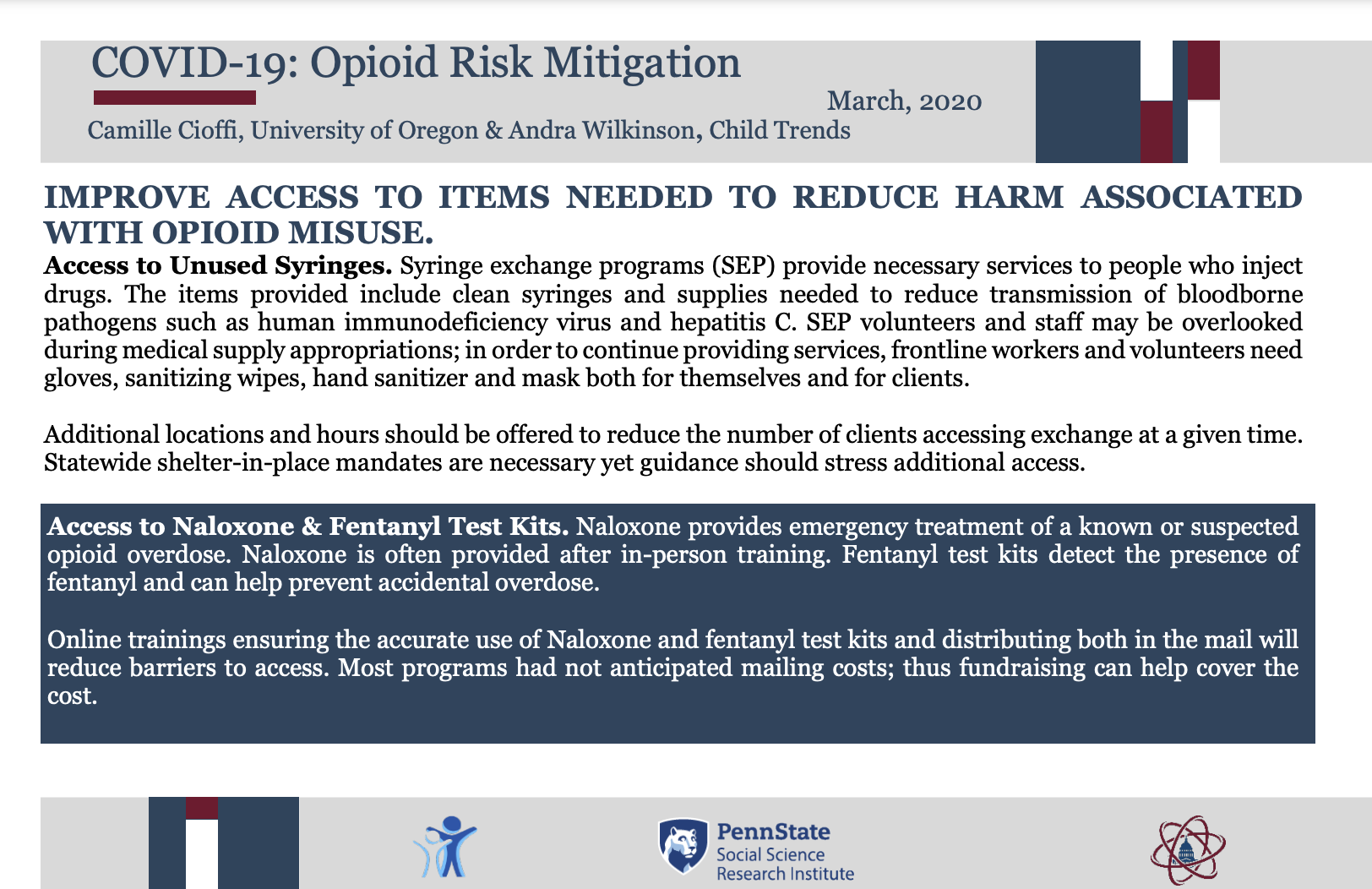
Improve Access to Items Needed to Reduce Harm Associated with Opioid Misuse.
Access to Unused Syringes
Syringe exchange programs (SEP) provide necessary services to people who inject drugs. The items provided include clean syringes and supplies needed to reduce transmission of bloodborne pathogens such as human immunodeficiency virus and hepatitis C. SEP volunteers and staff may be overlooked during medical supply appropriations; in order to continue providing services, frontline workers and volunteers need gloves, sanitizing wipes, hand sanitizer and mask both for themselves and for clients.
Additional locations and hours should be offered to reduce the number of clients accessing exchange at a given time. Statewide shelter-in-place mandates are necessary yet guidance should stress additional access.
Access to Naloxone and Fentanyl Test Kits
Naloxone provides emergency treatment of a known or suspected opioid overdose. Naloxone is often provided after in-person training. Fentanyl test kits detect the presence of fentanyl and can help prevent accidental overdose.
Online trainings ensuring the accurate use of Naloxone and fentanyl test kits and distributing both in the mail will reduce barriers to access. Most programs had not anticipated mailing costs; thus fundraising can help cover the cost.
The Research-to-Policy Collaboration (RPC) works to bring together research professionals and public officials to support evidence-based policy. Please visit their website to learn more.
Key Information
RPC Website
Research-to-Policy Collaboration
Publication Date
March 1, 2020
Topic Area(s)
Education and Child Development, Health, Substance Use and Misuse
Resource Type
Written Briefs
Share This Page
Improve Access to Items Needed to Reduce Harm Associated with Opioid Misuse.
Access to Unused Syringes
Syringe exchange programs (SEP) provide necessary services to people who inject drugs. The items provided include clean syringes and supplies needed to reduce transmission of bloodborne pathogens such as human immunodeficiency virus and hepatitis C. SEP volunteers and staff may be overlooked during medical supply appropriations; in order to continue providing services, frontline workers and volunteers need gloves, sanitizing wipes, hand sanitizer and mask both for themselves and for clients.
Additional locations and hours should be offered to reduce the number of clients accessing exchange at a given time. Statewide shelter-in-place mandates are necessary yet guidance should stress additional access.
Access to Naloxone and Fentanyl Test Kits
Naloxone provides emergency treatment of a known or suspected opioid overdose. Naloxone is often provided after in-person training. Fentanyl test kits detect the presence of fentanyl and can help prevent accidental overdose.
Online trainings ensuring the accurate use of Naloxone and fentanyl test kits and distributing both in the mail will reduce barriers to access. Most programs had not anticipated mailing costs; thus fundraising can help cover the cost.
The Research-to-Policy Collaboration (RPC) works to bring together research professionals and public officials to support evidence-based policy. Please visit their website to learn more.

Key Information
RPC Website
Research-to-Policy Collaboration
Publication Date
March 1, 2020
Topic Area(s)
Education and Child Development, Health, Substance Use and Misuse
Resource Type
Written Briefs
Share This Page
LET’S STAY IN TOUCH
Join the Evidence-to-Impact Mailing List
Keep up to date with the latest resources, events, and news from the EIC.




